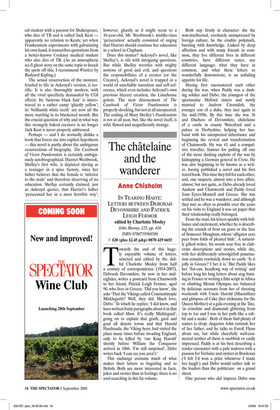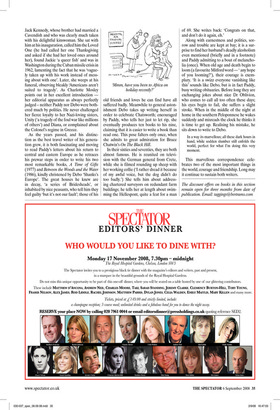The châtelaine and the wanderer
Anne Chisholm
IN TEARING HASTE: LETTERS BETWEEN DEBORAH DEVONSHIRE AND PATRICK LEIGH FERMOR edited by Charlotte Mosley John Murray, £25, pp. 416 ISBN 9780719568589 ✆ £20 (plus £2.45 p&p) 0870 429 6655 Towards the end of this hugely enjoyable volume of letters, selected and edited by the skilful Charlotte Mosley from half a century of correspondence (1954-2007), Deborah Devonshire, by now in her mideighties, writes a postcard from Chatsworth to her friend, Patrick Leigh Fermor, aged 90, who lives in Greece. ‘Did you know’, she asks ‘That the Vikings called Constantinople Micklegarth? Well, they did. Much love, Debo.’ To which he replies: ‘I did know, and have written fruity paragraphs about it in that book called Mani. It’s really Micklegard’, going on to explain that grath, gard and grad all denote towns and that Harold Hardraada, the Viking hero, had visited the place many times before invading England, only to be killed by ‘our King Harold’ shortly before William the Conqueror arrived in 1066. ‘I’m still surprised’, Debo writes back ‘I can see you aren’t.’ This exchange contains much of what makes their letters so beguiling and so British. Both are more interested in facts, jokes and stories than in feelings; there is no soul-searching in this fat volume. Both stay firmly in character: she the non-intellectual, resolutely unimpressed by foreign culture, he the erudite polymath, bursting with knowledge. Linked by deep affection and with many friends in common, they live different lives in different countries, have different tastes, use different language; what they have in common, and what these letters so wonderfully demonstrate, is an unfailing appetite for life.
Having first encountered each other during the war, when Paddy was a dashing soldier and Debo, the youngest of the spectacular Mitford sisters and newly married to Andrew Cavendish, the younger son of a duke, they met again in the mid-1950s. By this time she was 36 and Duchess of Devonshire, châtelaine of a castle in county Waterford and a palace in Derbyshire, helping her husband with his unexpected inheritance and beginning the revival and transformation of Chatsworth. He was 41 and a compulsive traveller, famous for pulling off one of the more dashing exploits of the war by kidnapping a German general in Crete. He was also beginning to be known as a writer, having published a novel and his first travel book. This time they fell for each other, and, one suspects, almost into a love affair; almost, but not quite, as Debo already loved Andrew and Chatsworth and Paddy loved Joan Eyres-Monsell and Greece. She was settled and he was a wanderer, and although they met as often as possible over the years on his visits to England it was on paper that their relationship really belonged.
From the start, his letters sparkle with brilliance and excitement, whether he is describing the crunch of frost on grass or the face of Somerset Maugham, whose ‘alligator eyes peer from folds of pleated hide’. A naturally gifted writer, his words soar free in elaborate descriptions and stories, while she, with her deliberately schoolgirlish punctuation remains resolutely down to earth. ‘Is it jolly in Greece? I bet it is.’ But Paddy likes her ‘flat-out, headlong way of writing’ and before long his long letters about stag hunting in France or writing a film script in Africa or climbing Mount Olympus are balanced by delicious accounts from her of shooting weekends with Uncle Harold (Macmillan) and glimpses of Cake (her nickname for the Queen Mother) at a gala evening at the Tate, ‘in crinoline and diamonds glittering from top to toe and I was in her path like a rabbit and a snake’. Both of them find plenty of names to drop; Augustus John reminds her of her father, and he talks to Erroll Flynn about sex, but while cheerfully well-connected neither of them is snobbish or easily impressed. Paddy is at his best describing a tender encounter with a pale waitress with a passion for Verlaine and oysters in Bordeaux (‘I felt I’d won a prize whenever I made her laugh’) and Debo would rather talk to the loaders than the politicians on a grand shoot.
One person who did impress Debo was Jack Kennedy, whose brother had married a Cavendish and who was clearly much taken with his delightful kinswoman. She sat with him at his inauguration, called him the Loved One (he had called her one Thanksgiving and asked if she had her loved ones around her), found Jackie ‘a queer fish’ and was in Washington during the Cuban missile crisis in 1962, lamenting the fact that he was ‘vaguely taken up with his work instead of messing about with one’. Later, she weeps at his funeral, observing bleakly ‘Americans aren’t suited to tragedy’. As Charlotte Mosley points out in her excellent introduction — her editorial apparatus as always perfectly judged – neither Paddy nor Debo were bothered much by politics. He never challenged her fierce loyalty to her Nazi-loving sisters, Unity (‘a tragedy of the foul war like millions of others’) and Diana, or complained about the Colonel’s regime in Greece.
As the years passed, and his distinction as the best travel writer of his generation grew, it is both fascinating and moving to read Paddy’s letters about his return to central and eastern Europe as he retraces his prewar steps in order to write his two most remarkable books, A Time of Gifts (1977) and Between the Woods and the Water (1986), kindly christened by Debo ‘Shanks’s Europe’. The great houses he knew are in decay, ‘a series of Bridesheads’, or inhabited by nice peasants, who tell him they feel guilty ‘but it’s not our fault’; those of his old friends and loves he can find have all suffered badly. Meanwhile to general astonishment Debo takes up writing herself in order to celebrate Chatsworth; encouraged by Paddy, who tells her just to let rip, she eventually produces ten books to his nine, claiming that it is easier to write a book than read one. This pose falters only once, when she admits to great admiration for Bruce Chatwin’s On The Black Hill.
In their sixties and seventies, they are both almost famous. He is reunited on television with the German general from Crete, while she is filmed rounding up sheep with her working collie (‘I rather dread it because of my awful voice, but the dog didn’t do too badly.’) She tells him about addressing chartered surveyors on redundant farm buildings; he tells her at length about swimming the Hellespont, quite a feat for a man of 69. She writes back: ‘Congrats on that, and don’t do it again, eh.’ Along with earnestness and politics, sorrow and trouble are kept at bay; it is a surprise to find her husband’s deadly alcoholism even mentioned (briefly and in a footnote) and Paddy admitting to a bout of melancholia (once). When old age and death begin to loom (a favourite Mitford word — ‘ any hope of you looming?’), their courage is exemplary. ‘It is a swizz everyone vanishing like this’ sounds like Debo, but is in fact Paddy, busy writing obituaries. Before long they are exchanging jokes about nice Dr Oblivion, who comes to call all too often these days; his eyes begin to fail, she suffers a slight stroke. When in the middle of the night at home in the southern Peloponnese he wakes suddenly and misreads the clock he thinks it is time to get up. Realising his mistake, he sits down to write to Debo.
In a way its marvellous; all these dark hours in hand, while sodden slumber still enfolds the world, perfect for what I’m doing this very moment.
This marvellous correspondence celebrates two of the most important things in the world, courage and friendship. Long may it continue to sustain both writers.
The discount offers on books in this section remain open for three months from date of publication. Email: taggings@bertrams.com



































































 Previous page
Previous page